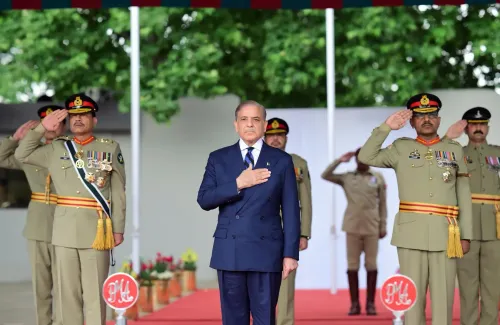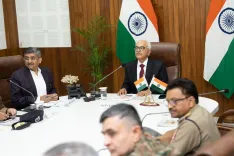How Are the Taliban Restricting Pakistan's Afghan Strategy?

Synopsis
Key Takeaways
- Pakistan's influence in Afghanistan is waning.
- The TTP poses significant threats to Pakistan's internal security.
- Diplomatic strategies must adapt to new realities.
- Civilians suffer the immediate consequences of regional violence.
- International mediation efforts are crucial.
Islamabad, Nov 18 (NationPress) Pakistan's influence in Afghanistan has long been anchored in its historical connections with Afghan insurgents, cross-border sanctuaries for proxies, and a military establishment that believed it could persuade Kabul, according to a recent report.
The report highlighted that following the Afghan Taliban's resurgence in 2021, Islamabad briefly thought these ties would enable it to control insurgent factions threatening its internal security, particularly the Tehrik-e-Taliban Pakistan (TTP). However, this assumption has increasingly shown to be delicate.
“For many years, Islamabad viewed Afghanistan as a strategic buffer and a sphere of influence — a territory to be guided, not merely bordered. That notion has been overturned. What was once a relationship of patronage and significance has morphed into a precarious adversarial environment where Pakistan’s capacity to influence outcomes is dwindling,” stated a report from the UK-based media outlet Milli Chronicle.
“The immediate causes are recognizable: the TTP's resurgence, the evolving objectives of the Afghan Taliban, and renewed regional dynamics. However, the underlying issue is institutional: Pakistan's coercive and diplomatic tools have diminished efficacy in Kabul compared to a decade ago, leading to a precarious situation for peace along a porous border,” it elaborated.
The report noted that in Pakistan, domestic political dynamics concerning counter-terrorism and the TTP's revival have influenced official perspectives.
“Policymakers are confronted with a stark choice: aggressive military actions across the border that could provoke escalation and international backlash, or a diplomatic approach that relies on a Kabul that is both willing and capable of action,” it emphasized.
This ambiguity, the report explained, has sparked sporadic violence rather than fostering a lasting resolution, with ceasefires being both established and broken, and confidence-building measures remaining weak. Observers have noted that Islamabad’s conventional methods — patronage networks, cross-border pressure, and economic incentives — are essential but inadequate to address the complex conflicts currently emerging.
The report stressed that the human toll is immediate, with civilians on both sides of the Durand Line suffering the consequences of violence through displacement, disrupted trade, and a resurgence of mistrust that jeopardizes long-term reconciliation efforts.
“The border is more than just a line on a map; it embodies a lived experience of interdependence and resentment. As violence escalates, international players — from Qatar and Turkey to regional capitals — are racing to re-establish mediation pathways, even as the on-ground reality resists tidy diplomatic solutions,” it remarked.









